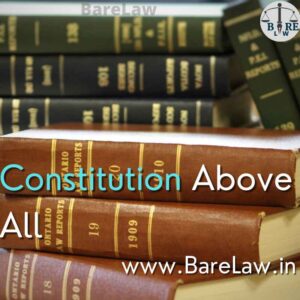
DEFINITION
The word ‘jurisprudence is formed from the Latin word ‘jurisprudential – the information on the law. “Juris” in Latin connotes “legitimate”, and “prudentia” signifies ‘expertise’ or ‘information. The word ‘jurisprudence’ has implied various things on various occasions. It is the name given to a specific kind of examination concerning a law, an examination of a theoretical, general, and hypothetical nature that tries to reveal the fundamental principles of law and overall sets of laws. The motivation behind jurisprudence is to concentrate on the law and legitimate ideas and examine something very similar to work with a superior comprehension of lawful intricacies.
Different jurists had a different understanding of the word “jurisprudence”. Professor Gray enumerated that “jurisprudence is the science of law, the statement and systematic arrangement of the rules followed by the courts and the principals involved in those rules.” Whereas Austin called jurisprudence the “philosophy of positive law.” According to Roscoe Pound, “jurisprudence is the science of law using the term ‘law’ in the juridical sense, as denoting the body of principles recognized or enforced by public and regular tribunals in the administration of justice.”
However, no single definition can be supposed to be all-around adequate. Maybe, the specific meaning of this term is beyond the realm of imagination in light of the fact that as a strategy, jurisprudence manages ideas that control human lead as per the qualities, necessities, and objectives of each person in the society.
EVOLUTION OF JURISPRUDENCE
Jurisprudence began in the Roman human progress with the Romans scrutinizing the significance and nature of law. It was very restricted since the ideas of law, ethics, and equity were mistaken for one another. References are likewise made to craft by old Greek savants like Homer, Socrates, Plato, and Aristotle. With the fall of the Roman Empire, the thoughts of Roman and Greek jurisprudence vanished and the Christian State emerged. Later, the authority of the church over the state was tested by the reformist, and thoughts of secularism arose. Numerous hypotheses were proposed with respect to the development and nature of the ‘state’ by rationalists like Hugo Grotius, John Locke, Rousseau, and Blackstone. The Age of Reason in the seventeenth century prompted the development of thoughts of cooperation and social government assistance. Gradually, the possibility of positive law and positivistic methodology acquired prominence whereby the limits of the law were divided and its degree was restricted. By the evolution of time different jurist gave their own interpretation about jurisprudence. In natural law school law was concerned with natural rights based on morals and divine law. In the analytical school, the law was considered as a command of sovereignty. Austin distinguishes law from custom and ethical abstract based. Holland defines jurisprudence as the formal science of positive law. Salmond considered jurisprudence as the science of just principle of civil law.
IMPORTANCE OF THE STUDY OF JURISPRUDENCE
One of the significant importance of the investigation of Jurisprudence is its basic worth. Jurisprudence primarily involves research and the technique to develop and explain the essential ideas of law. Salmond stood out for everyone in the way that jurisprudence has its inborn advantages like different subjects of law. For such a long time, the exploration work done on jurisprudence might have an impact on contemporary socio-political ideas or thoughts. Jurisprudence isn’t concerned about the making of the new laws; rather, it centers on existing laws in the framework and Jurisprudence, and its hypotheses can assist lawyers with shaping a superior and considerably more further developed practice.
Jurisprudence centers around essential lawful principles, however, it likewise discusses the social effect of those laws. Jurisprudence consolidates legitimate and hypothetical examination of lawful ideas. Jurisprudence additionally discusses political freedoms and lawful privileges and how the framework can endeavor to adjust them out. So it multiplies the insightful strategies and methods of an understudy.
The intricacies of law can be eliminated with the assistance of jurisprudence. It makes the law more reasonable and judicious by developing different ideas. Jurisprudence likewise centers on the law and its social worth. It discusses reasonableness and the enunciation of law. Jurisprudence manages the essential things of the law and it is the eye of law. It assists an individual with understanding the considerations and divisions of law.
Jurisprudence is likewise the grammar of law. It assists an individual with understanding the language and the grammar of law. Lawful language and grammar are altogether different when contrasted with conventional language, so Jurisprudence prepares the brain of a lawyer so he can utilize appropriate legitimate vocabularies and articulations. Jurisprudence gives the standards of translation. It helps in the precise translation of law by determining the exact implications of laws passed by officials.
JURISPRUDENCE – “AN EYE OF LAW”
The eyes are one of the main parts of the human body, likewise, the jurisprudence capacities for law a similar way as the eyes do in the human body. The translation of the law is a truly challenging undertaking; it very well may be managed without the assistance of jurisprudence.
It is said that Law manages the conduct of living people in a coordinated common society and even ensures the dead individual by keeping his/her standing unblemished. Along these lines, it is very well said that law is the real working component in keeping a general public precise making general public contact with people and accepting characters to act appropriately. The law, through its approvals, in if some random acknowledged rule is disregarded it forces discipline of various types according to needs. Law might be customary, legislated, or judge-made through their decisions. Also where, in a circumstance the arrangements of law are quiet, to do equity, the assistance of fundamental principles of law is looked for by the lawyers and judges. These fundamental principles are the topic and content of jurisprudence. Once more, in each Act, passed by the governing body (Parliament or State council) certain things associated with that Act, are characterized in the understanding proviso yet those terms which have settled importance in the jurisprudence are generally forgotten about and one can through the use of jurisprudence can undoubtedly discover the significance of those vague terms, without in the translation condition. In the event that essential principles of law that is the eye of the law, jurisprudence is appropriately applied or deciphered each such issue as raised above will remain as addressed. As such it could be said that the perception that ‘jurisprudence is the eye of the law’ might be treated as right as we have seen that essential principles of law are enduring and inescapable. The fundamental aim is to ensure the more fragile individual of the general public is secured by law through its eye.
SCHOOLS OF THOUGHT IN JURISPRUDENCE
Natural Law School
Natural law is widespread and normal to all humanity. It goes past the distinction in culture, religion, and different definitions of ethical law. It has been utilized to help practically any philosophy, absolutism, independence, and has motivated upsets and carnage too. The law is an instrument of social control as well as of social advancement also, it should have specific finishes. The ‘Natural Law’ hypotheses have basically been the speculations with respect to the closures of law. The Articles like Article 14, 19, and 21 has been generally deciphered in the Indian situation particularly by the Indian legal executive due to a great extent effect of the natural law hypothesis. Natural law suggests that laws are a sensible move from morals. Accordingly, activities that are viewed as ethically wrong will be illegal.
Philosophical School
The Philosophical School concentrates considerably more on the hypothesis of natural law or Divine Law of Jurisprudence. As per this school, the law is all-inclusive and everlasting in nature with a judicious and sensible methodology which is an immediate just as consistent movement from human morals. More or less, this school investigates law in the part of what it tries to be and expects to achieve – moral, sensible, and just. This school tries to discover the justification for why a law is ordered and what the impacts of such a law are on our general public. They accept the reason for the law is to improve the honorability of humanity.
Analytical School
Analytical School is considerably more centered on the hypothesis of basic law or order exuding from the state. Analytical school is identified with the beginning of common law. Analytical school discusses the idea of freedoms and obligations and explores legitimate models like demonstrations and agreements. Analytical school of law accepts that law ought to be arranged and the law should be represented by the state with the point of the advantage of individuals. Analytical school endeavors to recognize law all things considered and law as it should be. Despite the fact that Austin doesn’t keep the accomplishment from getting moral components in the production of law, he ignores morals in his hypothesis. Analytical Jurists accept that law is the result of human will. Accordingly, the normal methodology is that law is made by ‘somebody’. Analytical legal scholars have an unbending assessment against morals. Analytical legal scholars just spotlight the positive law. They are concerned distinctly with what is the unadulterated truth of law.
Historical School
The Historical School of Jurisprudence is one of the significant schools of law that came after the Natural Law. This law acknowledges that law, all things considered, is an aftereffect of a long time of the historical turn of events. This examination the thoughts, ideas just as the beginning of the law. Its course of action depends and varies with every person. Thusly, everyone has a substitute comprehension of the law. In the historical school of law, the law is the delayed consequence of past powers and past forces to be reckoned with. What’s more, the law is collected and created on the general familiarity with people. The historical school accepts that law is a result of long periods of development of our general public. The historical school accepts that the wellsprings of law are customs, strict methods of reasoning, and cultural standards. Historical school is an excess of ward previously and accordingly, it turns out to be considerably more moderate yet at the same time after such traditionalism, the historical school expresses that law should change with individuals.
Realist School
This school is known as ‘realist’ since it centers around an approach that concentrates on law all things considered in the real working and its belongings ahead. This school rejects the customary meaning of law and furthermore keeps away from any stubborn definition and completely focuses on choices given by the courts. Realist school is actually not a school of jurisprudence; rather realist school is mentoring of musings. It additionally makes a feeling of doubt in the customary legitimate qualities and furthermore the ideas planned so exceptionally far as they have all the earmarks of being portrayed what either courts or everyday citizens are really doing. In realist schools, they are considerably more centered on the activities of the court and what they make. Realist school simply does consistent suspicions from the overall law.
Sociological School
The jurists of this school of jurisprudence are inhering, Duguit, and Rosco pound. Sociological schools focused more on the capacity of law as opposed to its theoretical substance. This school underscored friendly wonder and realities. The sociological school appeared because of the aggregation of different considerations of law specialists. The sociological school needed to associate law with society and law can be changed by the necessities of the general public. Sociological school discusses legitimate establishments, tenets, and other hypothetical parts of the law. It was accepted that law is a wellspring of serving the necessities of society. The legal adviser of the Sociological school had a distinctive assessment of law however the fundamental result of their perspective was that the most extreme advantage to the general public ought to be furnished with the least fiction inside the general public.
CONCLUSION
Jurisprudence incorporates natural law, legitimate positivism, lawful authenticity, modern improvements in the way of thinking of law, and basic lawful examinations. It centers around questions, for example, what is law? It is an orderly and logical investigation of the current principles. It is likewise called the way of thinking of law. Jurisprudence gives the hypothetical establishment of the principles of law. Jurisprudence doesn’t restrict itself to the turn of events and advancement of law yet additionally contributes towards the improvement of other sociologies which thus prompts the general improvement of society. Jurisprudence is regularly alluded to as the grammar of law for it helps individuals in the lawful field to decipher a law better by giving essential thinking and thoughts behind a specific law. This gives a real significance to law and makes understandings simple.
You may also like to read:
-
02 Oct 2021 Case BriefsCase Brief on Rupa Ashok Hurra v. Ashok Hurra Writ petition (civil) 509 of 1997
-
06 Oct 2021 Legal AffairsAryan Khan’s Narcotics case – Legality
-
07 Oct 2021 Legal AffairsNDPA case against Aryan Khan
-
12 Sep 2021 Know Your LawConstitution above all
-
12 Sep 2021 The Constitution of IndiaFundamental Rights: Right to Constitutional Remedies









